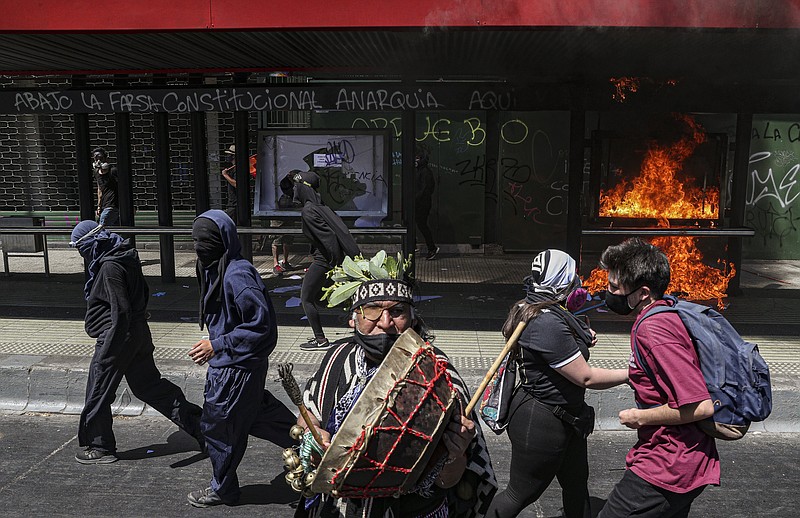MEXICO CITY -- Mexicans have never had much affection for Christopher Columbus, and officials were being coy about why his statue was removed from the capital's main boulevard over the weekend before Monday's observances of Columbus Day, which saw protests in several Latin American nations.
Unlike in other cities where monuments to the 15th century explorer have been toppled by protesters, in Mexico City the 19th century bronze statue was gently lifted off its pedestal with a crane and taken away for restoration. But leaders danced around the question of when, or whether, it would return.
President Andres Manuel Lopez Obrador said it was just a coincidence it was removed just before the anniversary of Columbus' arrival in the Americas -- known in the Spanish-speaking world as "Día de la Raza." In past years, leftist and indigenous groups have spray-painted the statue on Oct. 12, as well as during many other protests, and had appeared likely to do so again this year.
"As far as I know, they took the statue down to restore it. And, yes, it did coincide with today's date, but that should not be misinterpreted." Lopez Obrador said, while acknowledging "it is a date that is very controversial and lends itself to conflicting ideas and political conflicts."
In Mexico's western state of Michoacan, a coalition of largely Purepecha communities marked Monday by blocking roads leading into their territories and issued a statement saying that "we were not 'discovered' ... our lands were invaded and looted, not discovered."
Elsewhere in the region, an unauthorized march in support of Chile's biggest indigenous group, the Mapuche, flared up into clashes when police attempted to stop the demonstration. The Mapuche long resisted the Spanish conquerors, and later the Chilean government, and the march is held annually to bring attention to their plight and reiterate their claims to recover ancestral lands.
In Bolivia, protesters painted a statue of Columbus red to symbolize the blood of indigenous peoples and also dressed a statue of Queen Elizabeth I in the clothes of an indigenous Chola woman during demonstrations on what is known there as "Decolonization Day."
In Mexico, Lopez Obrador both rails against the conquest and has a keen appreciation of history, asking Mexicans "not to take their anger out on statues." He again demanded over the weekend that Spain and the Catholic Church apologize for abuses committed during the conquest of Mexico in the 1500s, though Spain already refused to apologize in 2019.
The National Institute of Anthropology and History, which oversees such monuments, said only that "the date for returning the statue will de determined by the Mexico City government" once restoration work is completed. There is one other less-prominent statue of Columbus in the capital, but it is in a little-visited median strip. Even so, a group of protesters gathered Monday and tried to reach that statue, but were driven back by police.
Mexico City Mayor Claudia Sheinbaum declined to say much about the fate of the main statue removed over the weekend.
"Maybe now that it is being restored and all, it would be worthwhile reflecting on what it represents," she said.
On whether the statue should be put back, Sheinbaum said: "I am not saying no, I am not saying yes. I do not even think the mayor should make that decision alone; I think a debate should be opened."
She also brought up the question of whether streets in the city should continue to bear the names of Spanish conquistadores like Pedro de Alvarado, one of Hernan Cortes' officers blamed for a massacre of people in Tenochtitlan, the Aztec capital that became Mexico City. A stretch of the Mexico-Tacuba causeway, one of the oldest streets in the Americas, bears the name "Puente de Alvarado" after the conquistador.
"I think it would be worthwhile for historians and the public and everybody to reflect on that, in light of next year," Sheinbaum said -- 2021 is the 700th anniversary of the founding of Tenochtitlan, the 500th anniversary of its fall to Cortes, and the 200th anniversary of the victory of Mexico's 1810-21 independence struggle against Spain.
On Monday, just two days after the statue was removed, the steel barriers protecting the stone base of the monument were already daubed with graffiti reading "Christopher Columbus, murderer!", "To the junkyard!" and "We brought him down!"
Most Mexicans have some indigenous ancestry and are keenly aware that during and after the conquest, millions of indigenous people died from violence and disease.
"I don't agree with having that kind of monument on the streets because I think they represent oppression," Viridiana Chacon, a marketing specialist, said Saturday as she passed by the empty base where the statue stood.









